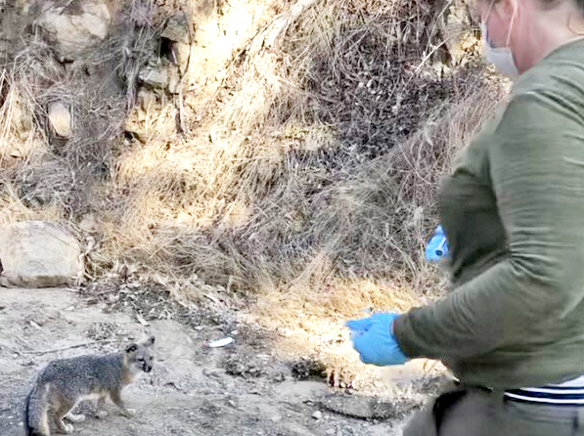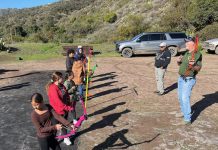
By Emily Hamblen, Catalina Island Conservancy Sr. Wildlife Biologist
The Catalina Island Conservancy team drives up and down Stage Road every day to work in the wildlands. Over the many years we have been working on the Island, one thing is very clear: we are very fortunate to work in a community that cares so much about the Catalina Island foxes.
Part of the Conservancy’s role involves investigating fox mortalities. Each time a deceased fox is found, our team members are called to the scene to determine the cause of death. It is not fun, but it is the best way to catch diseases and threats to the foxes early. We were very saddened this month to receive a call about a roadkill fox on Stage Road. As soon as we heard the location, we knew which fox we were going to see.
Conservancy biologists first caught this fox when she was a pup in 2012. We’ve given her a health checkup almost every year since then. In fact, on Friday, two days before her untimely demise, we gave her annual checkup. She was always gentle, didn’t bite, and was easier to work with than the average fox. After we released her, she stayed nearby in the road instead of running off. From these actions, it was clear she was being fed by humans.
Though this may sound like cute behavior, it is actually exactly what we don’t want to see in our foxes. This false sense of security around humans leads them into dangerous situations. When people feed foxes on the road, they are essentially conditioned to think that dinner is in the middle of a highway. Far too often, this behavior results in foxes being unintentionally lured to their death.
We do what we can to try to combat this conditioning. If you ever see our biologists running around clapping and yelling at wildlife, now you’ll know they’re not just doing it for fun. As a community, we cannot let the foxes become comfortable on roadways or we will see even more of them perish in the middle of the road.
Already, the Conservancy responds to 40-65 fox mortalities annually. It is hard for me not to feel a bit of hopelessness as I respond to these calls over and over again knowing how preventable this problem is.
The last time we saw this particular fox, just two days before she met her untimely demise, it was clear that she has had pups in the past.
We can only hope that she doesn’t have pups out there this season who are relying on her for their own survival, compounding this preventable heartbreak. Please help protect the foxes by not feeding them.
Spread the word and ask your friends not to feed these animals that call Catalina Island home.
Slow down on the road, especially at dawn and dusk, and keep an eye out for these curious creatures.
You might just save a life.










